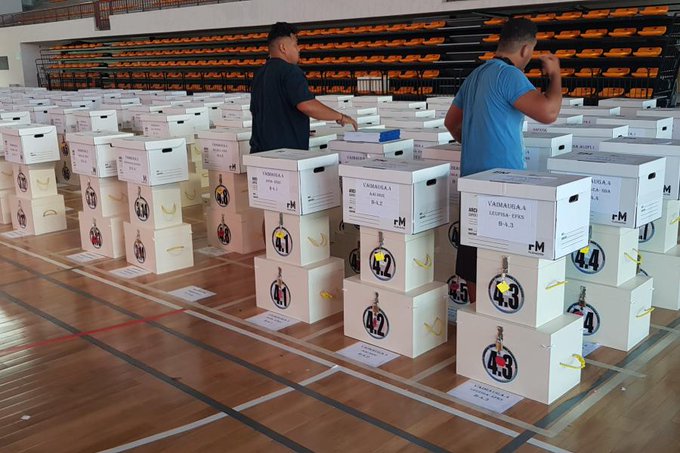A fierce power struggle is raging in the small Polynesian nation of Samoa ahead of the country’s next general election on April 9.
Election results in the central Pacific island nation of about 199,000 people, located northeast of Fiji, have been predictable for more than 20 years. Prime Minister Tuilaepa Sailele Malielegaoi has led the Human Rights Protection Party (HRPP) to victory in every five-year election since 1998, with little opposition. The party has been in power for nearly four decades.
Malielegaoi, now 75, has been in power for 23 years and is one of the region’s and the world’s longest-serving leaders.
This time, however, a fervent opposition has emerged, with new parties and candidates determined to bring about change at the top.
“When I think back to 2011 and 2016, it’s a different mood this time,” said Renate Rivers, an editor at the Samoa Observer.
“We’re discovering that a lot more people are feeling emboldened to speak openly about policies or candidates they support or oppose. Samoa has also been without an official opposition party for the past five years, so it has definitely felt like a wake-up call for many people who have realized they do have other options for the upcoming election,” she told Al Jazeera.
The most serious threat comes from the newly formed FAST coalition of three parties: the Fa’atuatua I le Atua Samoa ua Tasi (FAST) Party, the Samoa National Democratic Party, and the Tumua ma Puleono Party.
FAST is led by former Deputy Prime Minister Fiame Naomi Mata’afa, who resigned from the government and the HRPP, of which she had been a member for over 30 years, in September.
She was Samoa’s first female cabinet minister in 1991 and deputy prime minister in 2016. She is a senior politician, clan chief, and the daughter of the country’s first post-independence Prime Minister Fiame Mata’afa Faumuina Mulinu’u II.
Her defection came after she rejected controversial new legislation that she believes will exacerbate corruption, and it came after a heated public exchange with Malielegaoi in which he accused her of treason and she accused the ruling party of abuses of power.
‘It’s not getting any better.’
“HRPP has served its purpose for the past 40 years. With a population of less than 200,000 people, we should have at least a decent standard of living, given our $1.2 billion in foreign debt, but the country is not improving under HRPP’s watch,” a FAST spokesperson told Al Jazeera.
In 2019, 100 people died as a result of the government’s carelessness and ineptitude in dealing with the measles epidemic. Corruption abounds, with major contracts awarded to companies with close ties to cabinet ministers, as well as nepotism, as we have a prime minister, his son as finance minister, and his son-in-law as chief auditor.”
Samoa, a former German colony, was occupied and then administered by New Zealand from 1914 until 1962, when it gained independence.
It is a parliamentary democracy, but modern political leadership is inextricably linked to the “matais,” the country’s Indigenous clan chiefs who wield enormous power over family welfare, land, property, religion, and politics. Until 1990, only matais were allowed to vote and run for office.
Candidates for the majority of the 51-seat Legislative Assembly must still hold a matai title, but voting was extended to all citizens aged 21 and up late last century.
On Friday, 128,848 voters will go to the polls to select from a field of 189 candidates, more than 20 of whom are women. With 105 candidates, the HRPP, which holds the majority of parliamentary seats, has the most. The FAST coalition comes in second with 52 votes, followed by the Tatua Samoa Party and the Samoa First Party, which have 14 and 5 votes, respectively.
More infrastructure development is one of the ruling party’s promises, and it is competing with the FAST coalition on pledges to improve educational outcomes and hospital services. Malielegaoi believes he will win again this year, but Rivers, the journalist, believes the party is banking on “the voting public’s gratitude for the work done since they came into power.”
This includes shifting the island state’s road use from right to left in 2009 and shifting the international date line in 2011 in order to boost the economy and trade with Australasia and Asia. It was instrumental in increasing sub-regional cooperation in the same year, with the formation of the Polynesian Leaders Group.
The HRPP was contacted for comment on the election, but they did not respond.
Employment and the pandemic are likely to be important issues for voters.
“As a result of the COVID-19 pandemic, Samoa is experiencing economic hardship. The country is currently in a recession, and border closures have halted tourism earnings as well as slowed our seasonal employment arrangements. Many small businesses are struggling to stay afloat on the ground,” Rivers said.
Samoa has a GDP of $4,324 per capita, which is relatively high for the region. However, prior to the pandemic, the World Bank estimated that an estimated 20.3 percent of the population lived below the national poverty line, and the unemployment rate was around 14.5 percent.
Personal relationships
Another contentious issue is the government’s controversial passage of the new Land and Titles Court, Constitution Amendment, and Judicature Bills last year. Critics argue that these laws give the executive too much power, and that elevating the power of a new Land and Titles Court, which prioritizes customary law, weakens the Supreme Court’s ability to challenge abuses of power.
Mata’afa, acting on behalf of her electorate, Lotofaga, rejected all three last year.
According to its spokesperson, the FAST Party is now promising to “restore and uphold the rule of law, as the previous government and HRPP had dismantled the justice system by establishing two separate courts that undermine the role of the Supreme Court and the independence of the judiciary.”
Given the stakes, voter turnout is likely to be high, but other factors, such as family allegiances and diaspora support, will influence voting behavior.
“In Samoan politics, you generally have pretty small constituencies where voters know candidates because they’re family members, or part of the same church or village, so personal connections tend to be a lot more important than party policy,” said Kerryn Baker, a Pacific politics fellow at the Australian National University’s Department of Pacific Affairs.
The large diaspora, which is estimated to account for more than half of the country’s resident population, could also exert significant pressure.
According to Rivers, many Samoans living in Australia, New Zealand, and the United States support the opposition. “They have funded a large portion of the opposition’s campaign and launched a social media campaign that has been very effective in countering the ruling party’s rhetoric,” she said.
The return of writs for Samoa’s 17th Parliament is due on April 23.



